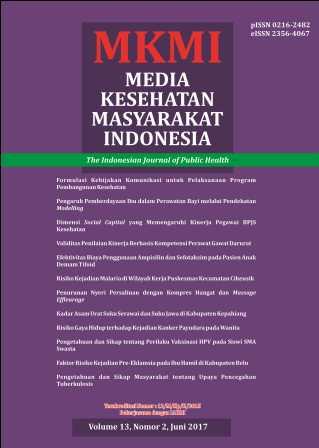DIMENSI SOCIAL CAPITAL YANG MEMENGARUHI KINERJA PEGAWAI BPJS KESEHATAN
Abstract
References
Gilley Ann, Jerry W.G., Scott A.Q., and Pamela D. The Praeger Handbook of Human Resource Management Volume 1 and 2. Westport: Greenwood; 2009. pp. 438.
Weaver,R.D., andHabibov, N. Sosial Capital, Human Capital, and Economic Well-Being In The Knowledge Economiy: Results From Canada’s General Social Survey. Journal of Sociology &Social Welfare. 2012;39(2):31-53.
Tsang, K-K. School Social Capital and School Effectiveness. Education Journal. 2010;37(1-2):119-136.
Ernstmann, N., Ommen, O., Driller, E., Kowalski, C., Neumann, N., Bartholomeyczik, S., and Pfaff, H.Social Capital and Risk Management in Nursing. J Nurs Care Qual. 2009;24(4):340-347.
Piskorski, M.J., and Gorbatai, A. Testing Coleman’s Social-Norm Enforcement Mechanism: Evidence from Wikipedia: Harvard Business School Working Paper. 2013;11(055).
Sultanah, A., Sobia, I., Kamran, A., and Nasir, M. Impact of Training On Employee Performance: A Study of Telecommunication Sector In Pakistan. Interdisciplinary Journal of Contemporary Research In Business. 2012;4(6):646-661.
Syauta, J.H., Eka, A.T., Margono, S., and Solimun. The Influence of Organizational Culture, Organizational Commitment to Job Satisfaction and Employee Performance (Study at Municipal Waterworks of Jayapura, Papua Indonesia). International Journal of Business and Management Invention. 2012;1(1):69-76.
Jeong, S.W. Impacts of Social Capital on Motivation, Institutional Environment, and Consumer Loyalty toward a Rural Retailer [Dissertations]. United States: Graduate School of The Ohio State University; 2011.
Abbasi, A., Liaquat, H., and Rolf, W. Social Capital and Individual Performance: A Study of Academic Collaboration. Journal of The Association for Information Science and Technology. 2011;63(12):1-18.
Creswell, J.W. Research Design: Qualitative, Quantitative, and Mix Methods Approaches. 3rd Ed. California: Sage Publication; 2009. pp. 18-19 and 156.
Zikmund, W.G., Barry, J.B., Jon, C.C., and Mitch, M. Business Research Methods. 9thEdition. Ohio: South-Western; 2013. pp. 554.
Hair, J.F., William, C.B., Barry, J.B., and Rolph, E.A. Multivariate Data Analysis: A Global Perspective. 7thEdition. New Jersey: Pearson Education; 2009. pp. 151.
Liu, H., Weiling, K., Kwok-Kei, W., and Yaobing, L. The Effects of Social Capital on Firm Substantial and Symbolic Performance In The Context of E-Business. School of Management University of Sciences of China: Working Paper; 2014.
Fauzan, M. Peningkatan Kinerja Dosen Berbasis Modal Sosial dan Dukungan Organisasional di PTS Kota Semarang. Jurnal Bisnis dan Ekonomi (JBE). 2012;19(2):188-202.
Vandaie, R. Developing A Framework to Describe the Interaction of Social and Intellectual Capital In Organizations. Journal of Knowledge Management Practice. 2007;8(1).
Hofstede, Geert. Demensionalizing Cultures: the Hofstede Model In Context. Online Readings In Psyhology and Culture. 2011;2(1):1-26.
Khatri,N. Consequences of Power Distance Orientation In Organisations. The Journal of-Business Perspective. 2009;13(1):1-9.
Ehman, A., Erlan B., Hidayet, T., and Sedat, K. Analysis of Relationship Among Social Capital, Organizational Justice and Performance with Structural Equation Model: The Case of Banking Sector. International Review of Social Sciences. 2014;2(7):207-220.
Leana, C.R.,and Pil, F.K. Social Capital and Organizational Performance: Evidence from Urban Public Schools. Organizational Science. 2006;17(3):353-366.
Turner, J.Social Capital: Measurement, Dimensional Interactions, and Performance Implications [Dissertations]. United States: Clemson University; 2011.
Ariani, D.W. The Relationship between Social Capital, Organizational Citizenship Behaviors, and Individual Performance: An Empirical Study from Banking Industry In Indonesia. Journal of Management Research. 2012;4(2):226-241.
Blad, Sofie. The Influence of Social Aspects On New Venture Creation – A Qualitarive Study On the Role of Entrepreneurs’ and Entrepreneuses’ Social Capital and Social Competence In The Start-Up Phase [Master Thesis]. Finland: Swedish School Of Economics and Business Administration; 2008.
Uzonna, U.R. Impact Of Motivation On Employees Performance: A Case Study of Creditwest Bank Cyprus. Journal of Economics and International Finance. 2013;5(5):199-211.
Syed, A.A., Sanjeev, B., and Anjali, S. Social Capital Framework: Examining the Online Public Conversation On Indian Discussion Board. AIMA Journal of Management & Research.
;8(1):1-23.
Authors
Authors retain copyright and grant the journal right of first publication with the work simultaneously licensed under a Creative Commons Atribusi-NonKomersial-BerbagiSerupa 4.0 Internasional License that allows others to share the work with an acknowledgement of the work's authorship and initial publication in this journal.
Copyright encompasses rights to reproduce and deliver the article in all form and media, including reprints, photographs, microfilms and any other similar reproductions, as well as translations. The reproduction of any part of this journal, its storage in databases and its transmission by any form or media, such as electronic, electrostatic and mechanical copies, photocopies, recordings, magnetic media, etc.
All articles published Open Access are free for everyone to read and download. Under the CC-BY-NC-SA license, authors retain ownership of the copyright for their article, but authors grant others permission to use the content of publications in Media Kesehatan Masyarakat Indonesia Universitas Hasanuddin in whole or in part provided that the original work is properly cited. Users (redistributors) of Media Kesehatan Masyarakat Indonesia Universitas Hasanuddin are required to cite the original source, including the author's names, Media Kesehatan Masyarakat Indonesia Universitas Hasanuddin as the initial source of publication, year of publication, and volume number.
Media Kesehatan Masyarakat Indonesia Universitas Hasanuddin is licensed under Creative Commons Atribusi-NonKomersial-BerbagiSerupa 4.0 Internasional.


